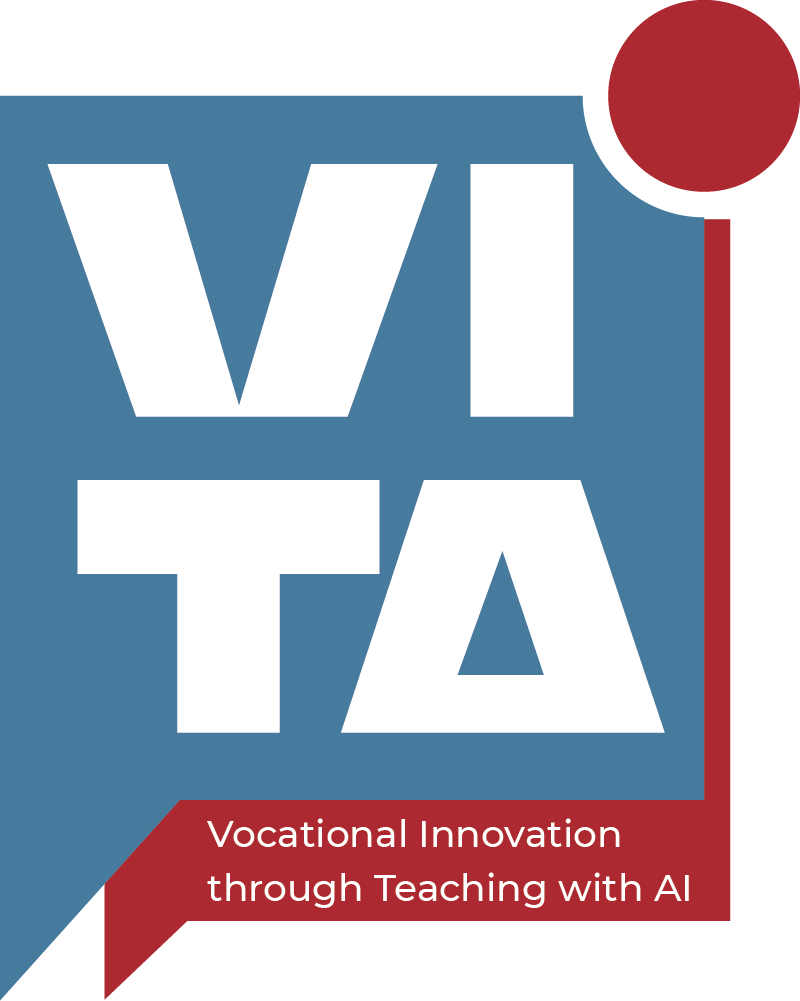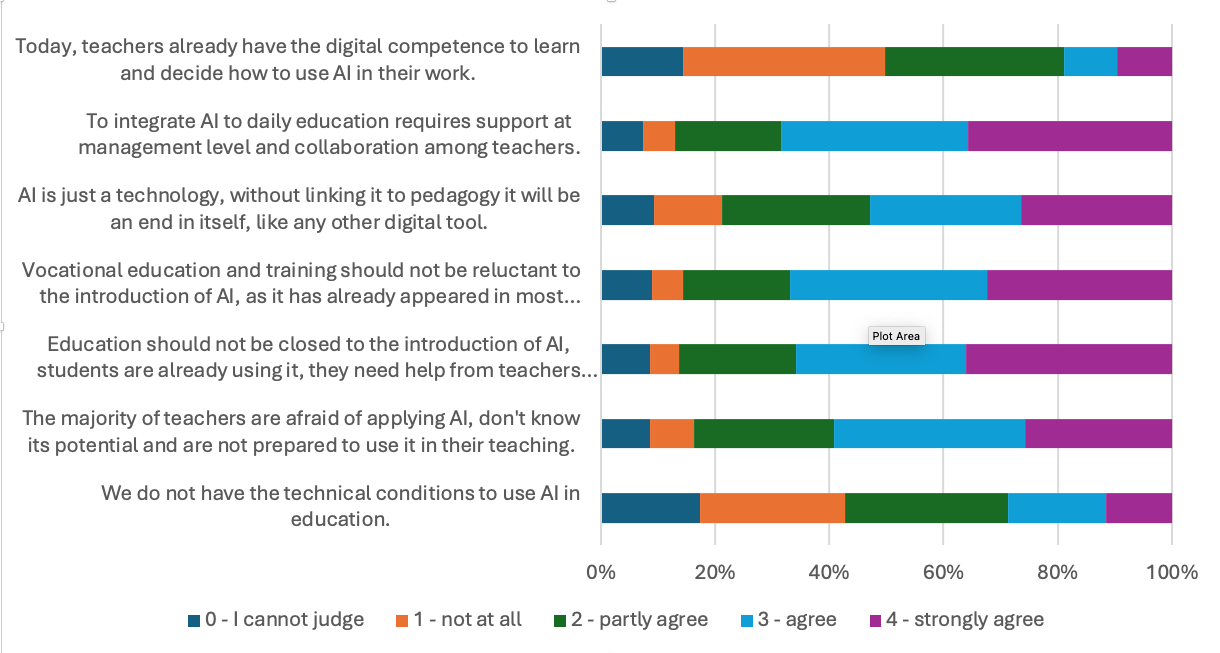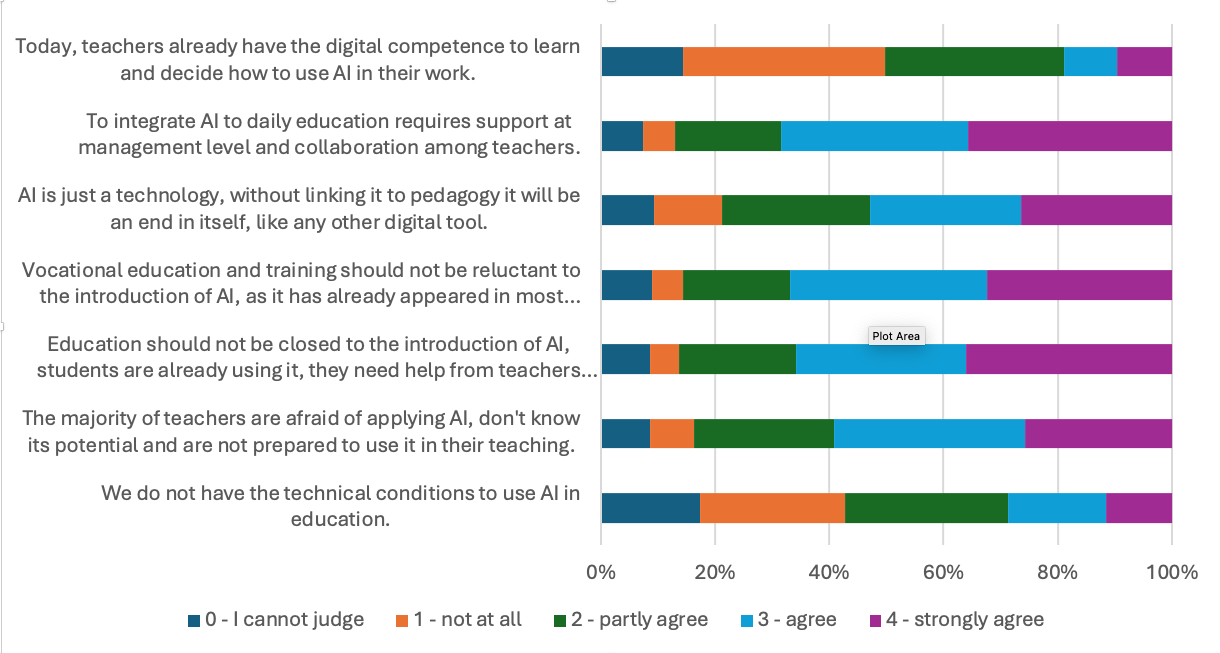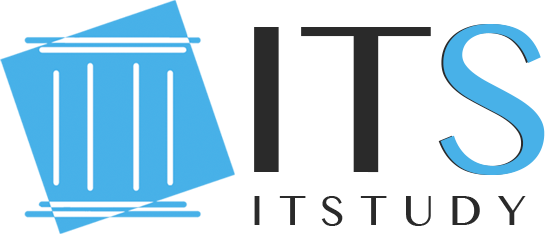
VITA - Vocational Innovation through Teaching with AI
Project Objectives
The project objectives are to empower vocational (VET) teachers with the knowledge and skills to seamlessly integrate artificial intelligence (AI) into their teaching practices. Beyond simply delivering AI knowledge, the project connects AI with active learning methodologies to foster more engaging and student-centered education.
Partners intend to develop a scalable, practice-oriented training model that supports self-development and collaboration between VET teachers and companies. By aligning AI-driven teaching approaches with industry needs, the project ensures that future employees are equipped with the skills and competencies demanded by the job market.
The ultimate goal is to embed AI into VET education by incorporating it into standard curriculum lessons, regardless of the subject or profession. This innovative approach prepares students to adapt to rapid technological advancements and thrive in an AI-powered world.
This partnership will implement a three-step model through the work packages.
- First, it will provide resources for developing AI-based learning content supported by collaboration between teachers and companies.
- Second, it will deliver blended training courses for VET teachers focused on the pedagogical use of AI in vocational education.
- As the goal is to guide the participants toward higher-level skills in using AI—from basic understanding to evaluation and creation, at the 3rd step teachers will be invited to implement AI-enhanced lessons in their classrooms, collect feedback, and reflect on their experiences. These classroom experiences will culminate in the publication of an e-book, showcasing best practices to support VET teachers across Europe.
Project Information
Project Acronym: VITA
Project ID: 2025-1-LT01-KA220-VET-000362456
Program: Erasmus + KA220-VET - Cooperation partnerships in vocational education and training
Target group: VET teachers and VET schools, beneficiaries: VET students
Partner countries: Lithuania, Hungary, Italy, Spain
Duration: 1st September 2025 - 31st August 2027
Coordinator: Alytaus Profesinio Rengimo Centras, Lithuania
Partners:
ITStudy Hungary Számítástechnikai Oktató- és Kutatóközpont Kft. (Hungary);
Fondazione Giovanni e Irene Cova (Italy);
AICA - Associazione Italiana Per L'informatica E Il Calcolo Automatico (Italy);
IET Institut Escola del Treball de Lleida (Spain)
SZÁMALK-Szalézi Szakgimnázium (Hungary).

Project news
The project starts in September of 2025. We share here the results of our preliminary research in 2024 aimed to get clear evidence, that there is a strong need for guiding vocational teachers to understand the basic concepts of artificial intelligence and to equip them with the knowledge and skills to effectively integrate artificial intelligence (AI) into their teaching.
As part of the proposal development process, the project partnership conducted an online survey to assess vocational teachers' readiness, attitudes, and needs related to the integration of Artificial Intelligence (AI) in education.
Survey period: 17–23 July 2024 Platform: EU Survey portal Sample size: 269 valid responses Countries represented: Hungary (29.89%), Italy (35.06%), Spain (21.77%), Lithuania (12.18%) Gender distribution: 56.83% female, 42.44% male Educational background: 68.27% held a master’s degree (MSc), but only 9.96% had vocational qualifications Teaching experience: 73% had over 11 years of experience |
The primary objective of the survey was to validate the following preliminary assumptions:
Vocational teachers often face uncertainty and hold misconceptions about AI.
Teachers acknowledge the increasing importance of AI in the labor market and recognize the need to adapt accordingly.
Although students are already engaging with AI technologies, many teachers feel unprepared to incorporate them into their teaching practices.
Educators show a willingness to adopt AI in the classroom but require targeted professional development to do so effectively.

MAIN CONCLUSIONS
Teachers expressed both optimism and caution regarding AI’s role in education. While 43% agreed that AI is essential for the labor market, over 50% believed that most teachers are not yet prepared to integrate AI into their classrooms. Furthermore, teachers stressed that effective AI integration requires managerial support and teacher collaboration.
The survey results clearly justify the relevance of the project’s aims, confirming that vocational teachers need targeted support to understand and apply AI in their teaching and that there is strong interest in student-centered, AI-integrated methodologies aligned with labor market demands.
More details in the document: Secondary School Teachers' Attitudes Toward AI Integration in Teaching - Survey across four European countries.
Information: maria.hartyanyi@itstudy.hu
